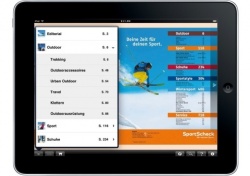The number of coupons circulated in the German retail trade last year exceeded ten billion, according to a report conducted by Germany’s leading clearing houses Acardo and Valassis. Experts believe that this figure is set to rise. They also predict a rise in coupons used via mobile phones and smartphones.
The forecast is based on an enormous increase in the number of mobiles and smart phones used by consumers. 83 per cent of all Germans aged 14+ now have mobile phones. Young people, in particular, always carry their phones with them: 74 per cent of all 14-29-year-old users never leave the house without their mobiles. Smartphones, too, are clearly on the rise. According to the German industry association Bitkom (Federal Association for Information Technology, Telecommunications and New Media), smartphones are set to hit the ten-million mark this year.
Coupon redemption apps
Moreover, there is a rapidly developing market for smartphone applications (apps). Not surprisingly therefore sales promotion increasingly involves the use of apps. Large numbers of retail-focused apps, software and hardware will therefore be presented at EuroCIS 2012, the leading trade fair in retail technology, which will be held in Düsseldorf from 28 February to 1 March 2012. Early this year a study was conducted by the EHI Retail Institute among just over 100 decision-makers in 81 retail companies in Germany, Austria and Switzerland. It turned out that the technical integration of marketing tools such as mobile couponing and smartphone apps are becoming increasingly important for IT decision-makers. Over 40 per cent of respondents felt that the introduction of mobile payment at their outlets can realistically be expected within the next three years.
At the last EuroCIS, which was held at the leading global trade fair EuroShop in February 2011, an integrated approach was demonstrated by Bizerba Interactive GmbH. It includes data input into customers’ smartphones via a scanner, the management and selection of coupons, the use of web-based databases such as Open Wallet (Acardo) and Valuephone, and a check-out procedure with a conditions check on goods purchased. Says Dobbin Lange, Managing Director of Bizerba Interactive: “When it comes to MC solutions, there is no room for exclusiveness in the German retail trade. Its structures are too small for that. The only promising solutions therefore are open solutions that involve as many players as possible.”
This explains why Bizerba Interactive uses its two options Open Wallet and Valuephone to support two players that are currently the only ones with a broad basis in German food retail. In early February the brand discounter Netto announced that it would soon launch a pilot phase for mobile couponing via Valuephone. The system will also be tested at Edeka’s Markt der Zukunft (Market of the Future) in Hamburg. The couponing and clearing specialist Acardo has its own solution, Open Wallet, which it is actively implementing at the stores of Neukauf Südbayern, a subsidiary of Edeka Handelsgesellschaft in southern Bavaria. “Our MC solution Open Wallet is modelled on an ordinary wallet. Consumers can conveniently download mobile coupons to their mobile phones, regardless of the brand. They can then carry those coupons with them and redeem them at any of the cash desks that are connected to the system,” says Acardo board member Thye.
Wincor Nixdorf offers its customers a solution called location-based couponing, which is initially only available at petrol stations. Product Manager Claus Vorbeck says: “Our worldwide customers include five of the ten largest oil companies with installations in 27 countries. Their network of petrol stations forms a key focus in our software development activities. For this customer group, Wincor Nixdorf has developed smartphone apps that can be customised for each network and which will work on all major operating systems. Each app only refers to locally available coupons, so that customers will not be confused by too many offers at petrol stations. Each app also has a navigation function that takes a customer directly to the nearest petrol station. A coupon is scanned in at the cash desk, using a barcode displayed on the smartphone monitor.”
Location-based couponing
Generally speaking, location-based couponing seems to be one of the keys to success in the market. This is borne out by the increasing number of competitors in mobile services and their success stories in industries where MC is already working without a hitch. International stars such as Groupon, Daily Deal, Facebook Deals and Four Square Special Offers are leading the way, and numerous German suppliers are showing that this also works in Germany. They include kaufDA, Gettings, Loxicon, Coupies and MyMobai.
These successes, however, are limited to industries outside the food retail trade – sectors which are simpler in structure, such as the catering trade, coffeeshops and franchise chains in the fashion industry. The reason why mobile couponing is ahead of the food retail trade in this area is the recording of coupons at the point of sale. It works well as long as the number of transactions remains manageable and does not slow down the check-out procedure to any significant extent. However, Martin Herzfeld, head of Customer Information Management at the German hypermarket chain Real, would go one step further: “When recording mobile coupons via smartphones and mobiles, we can only accept a solution that doesn’t slow down the check-out process at all. At the moment, however, we can’t see such a development in any of the existing scanning solutions, although it seems to work in conjunction with a customer card.” He means both physical handling and optical recording. Cashiers are not permitted to physically handle a customer’s smartphone. What is far more decisive, however, is optical recording via a mobile phone monitor.
Recording via scanners
One area that no longer poses any problems is the recording of data via modern image scanners, according to Dr. René Schiller, spokesman for Valuephone and GK Software: “It is possible to use conventional image scanners which are already in use at many food retail trade outlets. Also, there is a broad range of mobile devices that can now be used.” However, problems do still occur with laser scanners which are still widespread. Coupies co-founder Thomas Engel explains why: “Food retailers want to have a comprehensive solution that allows perfect integration, but without any additional investments in their cash systems. Our solution works with modern image scanners and also with old infrared scanners. It is only the laser beam that penetrates the monitor as far as the deepest layer. It does so without recognising any barcodes or QR codes that might be available in any of the layers further up.”
This is also confirmed by MyMobai CEO André Reif: “The latest image scanners are ideal, and eventually this will also be true for near field communication (NFC). Even before then, however, mobile couponing will prevail on the existing technical platform in the food retail trade. This confidence is shared by Acardo board member Christoph Thye, who points to Open Wallet technology – a solution which leaves it up to the retailer to decide how customers should be identified at the cash desk. This may be done, for example, via a customer card, a transaction number, a barcode or – eventually – an NFC. Important locally based couponing partners such as kaufDa, Gettings and Loxicon are already applying the open standard.
EuroCIS 2012 in Hall 9 of the Düsseldorf Exhibition Centre will be open to trade visitors daily from Tuesday 28 Feb. 2012 until Thursday 1 March 2012, 10:00 hrs to 18:00 hrs. Day tickets are EUR 22.00 (EUR 15.00 online in advance), and two-day tickets are EUR 38 (EUR 27 online in advance). Students and trainees pay EUR 10.00. Each ticket includes free transport to and from the Düsseldorf Exhibition Centre on local VRR buses, trams and trains. Further details on EuroCIS are available on the internet at www.eurocis.co










